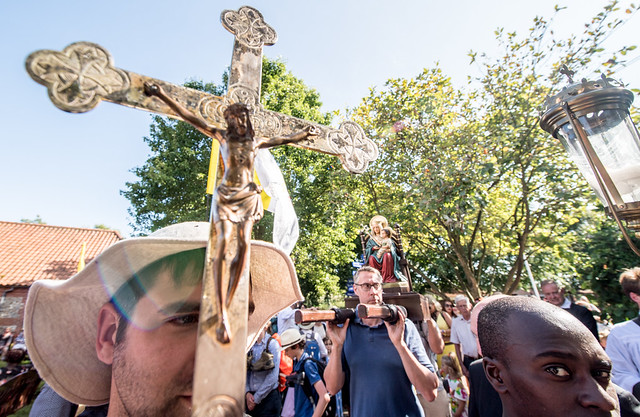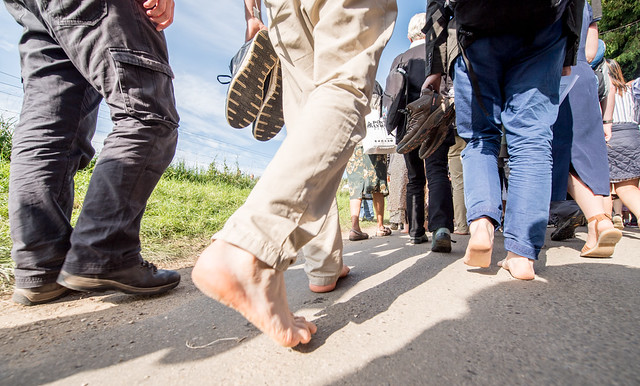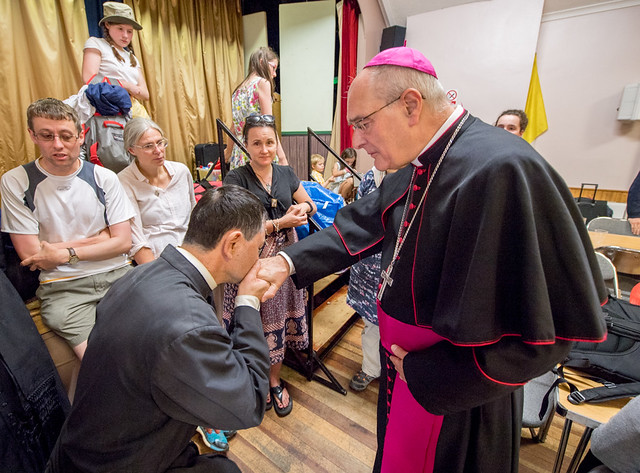I appear at the beginning of this programme presented by Raymond Arroyo; having said my piece, they let me go and Arroyo discusses the issues raised, with his 'Papal Posse', Fr Gerald Murray (a canonist) and Robert Royal.
It was pre-recorded; I was in a BBC studio in Edinburgh. The reason for some of the awkwardness of the questions and answers between me and Arroyo was the five-second time lag down the line between Edinburgh and Washington DC. I couldn't hear him trying to interrupt me until five seconds after he did it. (When you appear like this you can't see the presenter.) They tried to edit out the resulting pauses but there are limits.
Support the work of the LMS by becoming an 'Anniversary Supporter'.
Labels
- Bishops
- Chant
- Children
- Clerical abuse
- Conservative critics of the EF
- Correctio Filialis
- Fashion
- FIUV Position Papers
- Freemasonry
- Historical and Liturgical Issues
- Islam
- Liberal critics of the EF
- Marriage & Divorce
- Masculinity
- New Age
- Patriarchy
- Pilgrimages
- Pope Francis
- Pro-Life
- Reform of the Reform
- Young people
Saturday, September 30, 2017
Friday, September 29, 2017
Correctio Filialis: a response to some critics
Correctio Filialis: a response to some critics
The Filial Correction published last Sunday has attracted more support than I, as a signatory, had dared to hope. Additional signatures from pastors and academics have been submitted by the score; a petition in support has been signed by more than 10,000 people and counting; and it has been reported widely in the secular as well as the Catholic press.
There has been very little in the way of substantive response to the Correction from those who support what it criticises. Here I — in a personal capacity — want to look succinctly at three of the more serious attempts to get to grips with it. This is made easier by the fact that they all make essentially the same, erroneous criticism.
First, Stephen Walford writes, characteristically:
It is difficult to know where to start on this one: the hypocrisy or the risible accusations of heresy against the Holy Father. I’ll go with hypocrisy.
Labels:
Amoris laetitia,
Correctio Filialis,
Pope Francis
Tuesday, September 26, 2017
The mainstream media on the Correctio Filialis
When I agreed to be spokesman or media contact for the Correctio Filialis I didn't realise quite what was I was letting myself in for. I've now lost count of the number of telephone and email mini-interviews I've done, and I don't have time to keep track on the number of reports online which have resulted from these.
This could have been a nightmare, but it's not at all. The journalists have been polite and professional. (Associated Press was a teeny bit naughty breaking the media embargo, but it was only by an hour or two.) And all things considered, we are getting amazingly favourable coverage in Catholic and non-Catholic sources.
This could have been a nightmare, but it's not at all. The journalists have been polite and professional. (Associated Press was a teeny bit naughty breaking the media embargo, but it was only by an hour or two.) And all things considered, we are getting amazingly favourable coverage in Catholic and non-Catholic sources.
Labels:
Amoris laetitia,
Correctio Filialis,
Pope Francis
Monday, September 25, 2017
Reactions to the Filial Correction
Please note that academics and pastors who wish to are invited to apply to join the official list of signatories through a button on the website here (scroll down).
Everyone can sign the petition of support here.
I've been watching the reaction to the Filial Correction on the media - though I've certainly not read all of it - and the Catholic reaction in favour and against are both very interesting.
The reaction in favour has been overwhelming. At the time of writing the petition in support of the document has over 4,000 names, despite being very much an afterthought and not being integrated into the publicity.
But more important has been the tone of responses, and the range of people who have responded positively. Over the last forty years and more the 'conservative' end of the theological debate has been riven by disagreement about how bad things really are, and how strongly criticisms should be expressed. It sometimes seemed that every initiative by a conservative group would be denounced, simultaneously but by different people, as being excessively aggressive and as making too many concessions to liberalism: as being too strong and too weak. Differences of opinion on exactly how to protest about problems are inevitable, but these disagreements have at times become so violent as to cripple conservatives' ability to act at all.
Everyone can sign the petition of support here.
I've been watching the reaction to the Filial Correction on the media - though I've certainly not read all of it - and the Catholic reaction in favour and against are both very interesting.
The reaction in favour has been overwhelming. At the time of writing the petition in support of the document has over 4,000 names, despite being very much an afterthought and not being integrated into the publicity.
But more important has been the tone of responses, and the range of people who have responded positively. Over the last forty years and more the 'conservative' end of the theological debate has been riven by disagreement about how bad things really are, and how strongly criticisms should be expressed. It sometimes seemed that every initiative by a conservative group would be denounced, simultaneously but by different people, as being excessively aggressive and as making too many concessions to liberalism: as being too strong and too weak. Differences of opinion on exactly how to protest about problems are inevitable, but these disagreements have at times become so violent as to cripple conservatives' ability to act at all.
Labels:
Amoris laetitia,
Correctio Filialis,
Pope Francis
Saturday, September 23, 2017
With profound grief... A filial correction.
 |
| St Catherine of Siena before Pope Gregory XI |
info@correctiofilialis.org
or go to Change.org to support the petition.
With profound grief, but moved by fidelity to our Lord Jesus Christ, by love for the Church and for the papacy, and by filial devotion toward yourself, we are compelled to address a correction to Your Holiness on account of the propagation of heresies effected by the apostolic exhortation Amoris laetitia and by other words, deeds and omissions of Your Holiness.
We are permitted to issue this correction by natural law, by the law of Christ, and by the law of the Church, which three things Your Holiness has been appointed by divine providence to guard.
By natural law: for as subjects have by nature a duty to obey their superiors in all lawful things, so they have a right to be governed according to law, and therefore to insist, where need be, that their superiors so govern.
By the law of Christ: for His Spirit inspired the apostle Paul to rebuke Peter in public when the latter did not act according to the truth of the gospel (Gal. 2). St Thomas Aquinas notes that this public rebuke from a subject to a superior was licit on account of the imminent danger of scandal concerning the faith (Summa Theologiae 2a 2ae, 33, 4 ad 2), and ‘the gloss of St Augustine’ adds that on this occasion, “Peter gave an example to superiors, that if at any time they should happen to stray from the straight path, they should not disdain to be reproved by their subjects” (ibid.).
The law of the Church also constrains us, since it states that “Christ’s faithful . . . have the right, indeed at times the duty, in keeping with their knowledge, competence, and position, to manifest to the sacred pastors their views on matters which concern the good of the Church” (Code of Canon Law 212:2-3; Code of Canons of Oriental Churches 15:3).
I am a signatory of the document which begins with these words, and also its spokesman. You can read the full text on Rorate Caeli, and on a specially made website, http://correctiofilialis.org/ [corrected]. See also 1Peter5's commentary.
The document is signed by 62 people, Catholic academics and pastors, from 20 countries. It expresses, in technical theological language, the concern that, while Amoris laetitia itself may be open to an interpretation in line with the previous teaching of the Church, various informal indications, which appear to be favoured by Pope Francis himself, point to an interpretation not in line with that teaching.
Either the new view is wrong, or the old one is. There has in fact been no attempt to promulgate the new view magisterially - that is from the Holy Father himself, clearly, and in an authoritative format, such as a formal document - since Amoris laetitia itself. It would seem, in any case, that such an attempt could not be successful, in the sense of creating an obligation on Catholics to assent to this new view, because the old view expressed the Ordinary Magisterium, based on Scripture, and this teaching cannot be changed. In short, it seems to me that the new view which has been suggested and insinuated is incompatible with the Faith.
That does not mean that the Pope is a heretic. There is a wide gap between appearing to favour a view which is objectively contrary to the faith, and being a heretic, one part of which is the knowledge and intentions of the person concerned, and another part of which is the judgement of that person by a competent superior. We cannot ascertain the former, and as for the latter, in the law of the Church, the Pope has no superior. Judgment of the Pope's culpability or personal state has absolutely no place in this project.
What we can do, and are doing, is simply pointing out that the view being insinuated is not the Catholic faith, as we are able to understand it. In such a case, where the stakes are so high, it seems to us an obligation to discharge our consciences to the Holy Father himself, privately, as we did a month and more ago. And then, in the absence of a response, to manifest our concerns to the Catholic public at large.
This does not mean that I think I am or the petitioners as a group are infallible. It just means that I feel I must manifest my view. It is for those with teaching authority to address our concerns, to make clear what is unclear, and to show us, if necessary, where we have gone wrong. Any document like this, within the Church, is designed to stimulate the exercise of the magisterium, not to undermine or replace it.
Posted on the Feast of Our Lady of Ransom, and of Walsingham.
St Catherine of Siena, pray for us.
Support the work of the LMS by becoming an 'Anniversary Supporter'.
The document is signed by 62 people, Catholic academics and pastors, from 20 countries. It expresses, in technical theological language, the concern that, while Amoris laetitia itself may be open to an interpretation in line with the previous teaching of the Church, various informal indications, which appear to be favoured by Pope Francis himself, point to an interpretation not in line with that teaching.
Either the new view is wrong, or the old one is. There has in fact been no attempt to promulgate the new view magisterially - that is from the Holy Father himself, clearly, and in an authoritative format, such as a formal document - since Amoris laetitia itself. It would seem, in any case, that such an attempt could not be successful, in the sense of creating an obligation on Catholics to assent to this new view, because the old view expressed the Ordinary Magisterium, based on Scripture, and this teaching cannot be changed. In short, it seems to me that the new view which has been suggested and insinuated is incompatible with the Faith.
That does not mean that the Pope is a heretic. There is a wide gap between appearing to favour a view which is objectively contrary to the faith, and being a heretic, one part of which is the knowledge and intentions of the person concerned, and another part of which is the judgement of that person by a competent superior. We cannot ascertain the former, and as for the latter, in the law of the Church, the Pope has no superior. Judgment of the Pope's culpability or personal state has absolutely no place in this project.
What we can do, and are doing, is simply pointing out that the view being insinuated is not the Catholic faith, as we are able to understand it. In such a case, where the stakes are so high, it seems to us an obligation to discharge our consciences to the Holy Father himself, privately, as we did a month and more ago. And then, in the absence of a response, to manifest our concerns to the Catholic public at large.
This does not mean that I think I am or the petitioners as a group are infallible. It just means that I feel I must manifest my view. It is for those with teaching authority to address our concerns, to make clear what is unclear, and to show us, if necessary, where we have gone wrong. Any document like this, within the Church, is designed to stimulate the exercise of the magisterium, not to undermine or replace it.
Posted on the Feast of Our Lady of Ransom, and of Walsingham.
St Catherine of Siena, pray for us.
Support the work of the LMS by becoming an 'Anniversary Supporter'.
Labels:
Amoris laetitia,
Correctio Filialis,
Pope Francis
LMS Pilgrimage to Glastonbury
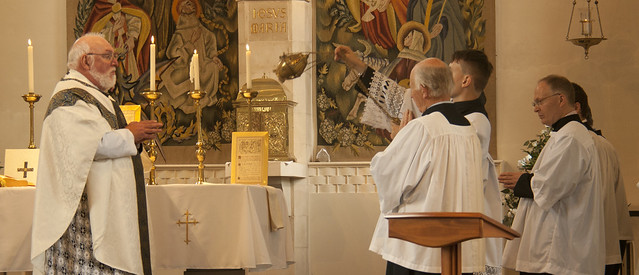
This year I was able to get to the Latin Mass Society's longstanding pilgrimage to Glastonbury, one of the ancient holy places of Europe. It generally takes place on the first Saturday of September.
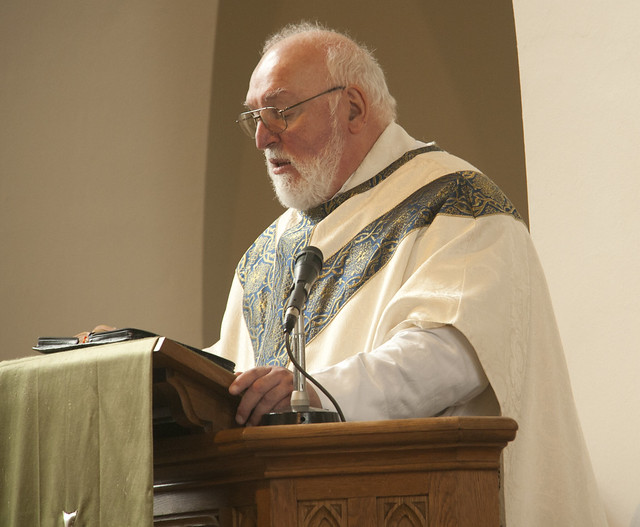
A Sung Mass was celebrated by Fr Philip Thomas. By coincidence, it has been announced that another priest of Clifton who has done much for the Traditional Mass, Fr Bede Rowe, will be taking over as Parish Priest of Glastonbury.
Wednesday, September 20, 2017
Cardinal Sarah's proposed reform of the Traditional Mass
In addressing the Summorum Pontificum Pilgrimage to Rome last weekend, with many very fine and important things to say, on the occasion of the 10th Anniversary of Summorum Pontificum, Cardinal Sarah acknowledged the response to his earlier remarks on the subject of ‘reconciling’ the Ordinary and the Extraordinary Forms of the Roman Rite.
In July I spoke of a possible future reconciliation between the two forms of the Roman rite. Some have interpreted this expression of personal opinion as the announcement of a programme that would end up in the future imposition of a hybrid rite which would bring about a compromise that would leave everybody unhappy and would abolish the usus antiquior by stealth, as it were. This interpretation is absolutely not what I intended. What I do wish to do is to encourage further thought and study on these questions in peace and tranquillity and in a spirit of prayerful discernment. There are improvements which can be made to both forms of the Roman rite in use today, and both forms can contribute to this in due course.
Tuesday, September 19, 2017
The Traditional Mass and Ecclesiology
I'm reposting this again because the general issue of obedience to casual words of the reigning Pope is current again, and also because this incident is recounted in Leo Darroch's book on the history of the FIUV which was launched in Rome on Sunday, and is available to buy here.
----------------------
Basil Loftus has circled back to his story about Cardinal Benelli in his latest column in the Catholic Times, so I thought I'd repost this response to it from April 2016
-------------------------------------
Thanks to the archives of the FIUV, I can shed some light on something mentioned by Mgr Basil Loftus in a column I discussed the other day. He'd picked up the claim that Cardinal Benelli had once said to the President of the Una Voce Federation (FIUV), Dr Eric de Savanthem, that there was a connection between the Traditional Mass and ecclesiology. (Contrary to Loftus, Benelli was actually made a cardinal the year after this meeting, in 1977.)
I noted that Lofus didn't cite a source for this: when one realises what his source is, it is easy to see why he'd rather his readers didn't know. Here is a longer extract: I've emboldened the words quoted verbatim by Loftus to the hapless readers of the Catholic Times on 27th March.
When the President of Una Voce at an interview with Archbishop (now Cardinal) Benelli in Rome in October 1976, pointed out the existing liturgical chaos and asked how, in view of this state of things, the suppression of the old Mass could be justified, he was told that “those who wish to retain the old Mass have a different ecclesiology.” This from one of the closest advisors of the then Pope; it meant that those who were faithful to Catholic tradition were now to be treated as dissidents. The phrase quod semper, quod ubique, quod ab omnibus (“What has been believed always, everywhere, and by all”) as a criterion of orthodoxy bad now been rejected in favor of a new Party Line which contradicted the Church’s entire previous tradition. What was forbidden and condemned yesterday becomes lawful today, and mandatory tomorrow. What had always been seen as black, is now white, and vice versa─because the Party says so. This comes close to the Bolshevik criterion of morality: what is right or wrong is simply what helps or hinders the Party.(Source: SSPX USA District)
----------------------
Basil Loftus has circled back to his story about Cardinal Benelli in his latest column in the Catholic Times, so I thought I'd repost this response to it from April 2016
-------------------------------------
 |
| Giovanni, Cardinal Benelli |
Thanks to the archives of the FIUV, I can shed some light on something mentioned by Mgr Basil Loftus in a column I discussed the other day. He'd picked up the claim that Cardinal Benelli had once said to the President of the Una Voce Federation (FIUV), Dr Eric de Savanthem, that there was a connection between the Traditional Mass and ecclesiology. (Contrary to Loftus, Benelli was actually made a cardinal the year after this meeting, in 1977.)
I noted that Lofus didn't cite a source for this: when one realises what his source is, it is easy to see why he'd rather his readers didn't know. Here is a longer extract: I've emboldened the words quoted verbatim by Loftus to the hapless readers of the Catholic Times on 27th March.
When the President of Una Voce at an interview with Archbishop (now Cardinal) Benelli in Rome in October 1976, pointed out the existing liturgical chaos and asked how, in view of this state of things, the suppression of the old Mass could be justified, he was told that “those who wish to retain the old Mass have a different ecclesiology.” This from one of the closest advisors of the then Pope; it meant that those who were faithful to Catholic tradition were now to be treated as dissidents. The phrase quod semper, quod ubique, quod ab omnibus (“What has been believed always, everywhere, and by all”) as a criterion of orthodoxy bad now been rejected in favor of a new Party Line which contradicted the Church’s entire previous tradition. What was forbidden and condemned yesterday becomes lawful today, and mandatory tomorrow. What had always been seen as black, is now white, and vice versa─because the Party says so. This comes close to the Bolshevik criterion of morality: what is right or wrong is simply what helps or hinders the Party.(Source: SSPX USA District)
Monday, September 18, 2017
New Council elected by Una Voce International
I attended the 'closed' or business meeting of Una Voce International - the Foederatio Internationalis Una Voce, FIUV - which takes place every two years and elects (or re-elects) the organisation's officers and Council.
Like most voluntary organisations, the FIUV is never overwhelmed by people wanting to take on positions of responsibility. We are very grateful to Felipe Alanis Suarez (from Mexico) for agreeing to do another term as President, and to Monika Rheinsmitt for carrying on as Treasurer. I agreed to be Secretary, a post I have not undertaken before. (I was Treasurer 2013-'15.)
Apart from the usual and, often in their most interesting aspects, confidential contact with the Curia, and the development of the organisation (such as the admission of new members), the big news of this year's General Assembly is the publication of the history of the FIUV by Leo Darroch, from the beginning (1965) up to the resignation of Michael Davies as President in 2002. It is a substantial work and I'll be writing reviews of it in various formats soon: buy it from the LMS bookshop here.
Here is the full list of Officers an pd Council members of the FIUV
Like most voluntary organisations, the FIUV is never overwhelmed by people wanting to take on positions of responsibility. We are very grateful to Felipe Alanis Suarez (from Mexico) for agreeing to do another term as President, and to Monika Rheinsmitt for carrying on as Treasurer. I agreed to be Secretary, a post I have not undertaken before. (I was Treasurer 2013-'15.)
Apart from the usual and, often in their most interesting aspects, confidential contact with the Curia, and the development of the organisation (such as the admission of new members), the big news of this year's General Assembly is the publication of the history of the FIUV by Leo Darroch, from the beginning (1965) up to the resignation of Michael Davies as President in 2002. It is a substantial work and I'll be writing reviews of it in various formats soon: buy it from the LMS bookshop here.
Here is the full list of Officers an pd Council members of the FIUV
Tuesday, September 12, 2017
Photos from Walsingham, Part 3
Monday, September 11, 2017
Photos from Walsingham, Part 2
Sunday, September 10, 2017
Photos from Walsingham: Part 1
Most of these photos are by John Aron, our brilliant photographer; a couple are by me.
The pilgrimage was brilliant, and the numbers were our highest ever. I'm going to let the photos do the talking.
Gathering on Thursday evening: dinner.
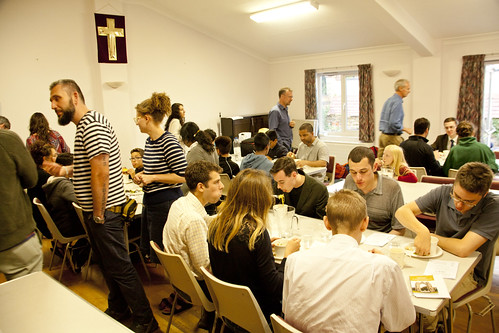
Mass early on Friday morning, celebrated by Fr Michael Rowe
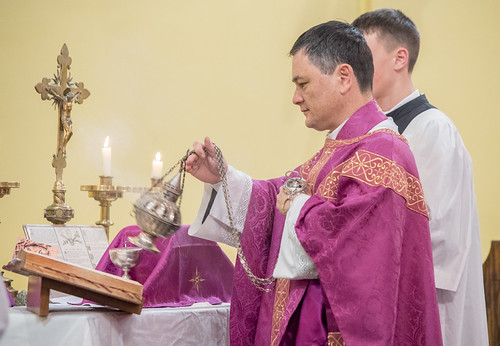
The pilgrimage was brilliant, and the numbers were our highest ever. I'm going to let the photos do the talking.
Gathering on Thursday evening: dinner.

Mass early on Friday morning, celebrated by Fr Michael Rowe

A new liturgy war? Magnum principium
Pope Francis has promulgated a Motu Proprio, Magnum principium, giving Bishops’ Conferences somewhat more authority over the translations used in their areas. Conferences always had a lot to do with translations, and Rome still has the final say, so I have to defer to others who understand these things exactly what, if any, difference this is going to make.
I don't expect the English speaking bishops to start making big changes, as everyone sensible is thoroughly exhausted by the revision of 2011. The amount of time, money, and energy required for this things is gigantic. However, I suppose we can expect liturgical progressive to initiate a renewed debate about ‘inclusive language’, ‘pro multis’, and the word ‘ineffable’, because they will always do that given half a chance.
Saturday, September 09, 2017
Pontifical Mass in St Bede's, Thurs 28th Sept
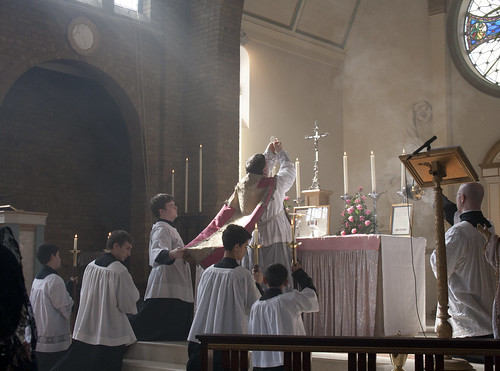 |
| Laudete Sunday Mass at St Bede's |
Pontifical Mass at the Faldstool will be celebrated
by Abbot Phillip Anderson OSB
from Clear Creek Monastery
Thursday 28 September
at 11.00am
at Saint Bede Church
58 Thornton Road
Clapham Park
London SW12 0LF
There will be chance to meet the Abbot after Mass in the parish hall.
Support the work of the LMS by becoming an 'Anniversary Supporter'.
Support the work of the LMS by becoming an 'Anniversary Supporter'.
Friday, September 08, 2017
What Rees-Mogg could have said
 Every Catholic politician from Parish Councillor up needs to have a rehearsed answer to the 'bloody questions' of today, just as the Jesuits and seminary priests of penal times had a rehearsed answer to the 'bloody question' of penal times (viz.: if the Spaniards invaded to topple Queen Elizabeth, who would you support?).
Every Catholic politician from Parish Councillor up needs to have a rehearsed answer to the 'bloody questions' of today, just as the Jesuits and seminary priests of penal times had a rehearsed answer to the 'bloody question' of penal times (viz.: if the Spaniards invaded to topple Queen Elizabeth, who would you support?).Today's 'bloody questions' are these:
Is gay sex a sin?
Would you force a woman pregant from incestuous rape to continue with the pregnancy?
The thing about such questions is that they are framed in a slanted way, but if you refuse to answer, it will look not only weasally but also a tacit admission that you hold the most unpopular views possible. In answering them, you have to try to reframe it, but you have to do this in a few words, before you get interrupted. You have about ten seconds, and each ten-second statement must make sense on its own.
I don't claim to be an expert on media engagement - though I have been in the hotseat a handful of times. The point of this post is not to criticise anyone who has no time to think under pressure, but to make some suggestions about how we can think about these things when we do have the chance: in advance.
So, Mr Shaw, is gay sex a sin?
Thursday, September 07, 2017
Why Rees-Mogg is wrong
 The knives are out for Jacob Rees-Mogg MP for saying that, as a Catholic, he opposes Same Sex Marriage (SSM) and abortion in all circumstances, in this TV interview. I agree and support him, but I feel I must qualify the way he expressed himself, not on a matter of mere technical accuracy but in relation to questions of fundamental importance.
The knives are out for Jacob Rees-Mogg MP for saying that, as a Catholic, he opposes Same Sex Marriage (SSM) and abortion in all circumstances, in this TV interview. I agree and support him, but I feel I must qualify the way he expressed himself, not on a matter of mere technical accuracy but in relation to questions of fundamental importance.First, he repeatedly notes that he accepts Church teaching, and this is why he opposes these two things. Since many non-Catholics agree with him, today and in the past, this seems a curious way of talking. It seems to be an implicit appeal to religious freedom, and this is indeed how the debate about his comments is now playing out in the media: the question has become 'can Catholics lead political parties, or hold important government positions?' The argument for answering that question in the affirmative is 'religious freedom'. We shouldn't exclude people from positions just because of their religious affiliation. Rees-Mogg and other Catholics should be allowed their eccentric views because those views are part of being Catholic.
Wednesday, September 06, 2017
LMS Brinkburn Pilgrimage: this Saturday
 Brinkburn Priory, a Medieval monastic house dissolved in the 16th century and later re-roofed, hosts an annual pilgrimage organised by the Latin Mass Society.
Brinkburn Priory, a Medieval monastic house dissolved in the 16th century and later re-roofed, hosts an annual pilgrimage organised by the Latin Mass Society.
Brinkburn Priory
Longframlington, Morpeth, Northumberland, NE65 8AR
Longframlington, Morpeth, Northumberland, NE65 8AR
Fr Michael Brown, our Chaplain in the North of England, writes:
The annual Mass at Brinkburn Priory will take place on Saturday 9th September at 12 noon. This will be the twenty-third and last. The choir Antiphon will be singing the Missa L'homme arme' by Guillaume Dufay with the motets Benedicta et venerabilis by Byrd and Parsons Ave Maria. We will also have a Gregorian chant group led by David Edwards. I`m hoping the Mass will be a Solemn High celebration but am still trying to confirm the sacred ministers.
This looks like being the last pilgrimage Mass in Brinkburn, because of 'health and safety' concerns about candles and incense. See Fr Brown's post for more.
Support the work of the LMS by becoming an 'Anniversary Supporter'.
This looks like being the last pilgrimage Mass in Brinkburn, because of 'health and safety' concerns about candles and incense. See Fr Brown's post for more.
Support the work of the LMS by becoming an 'Anniversary Supporter'.
Tuesday, September 05, 2017
What's wrong with Yoga? Part 2
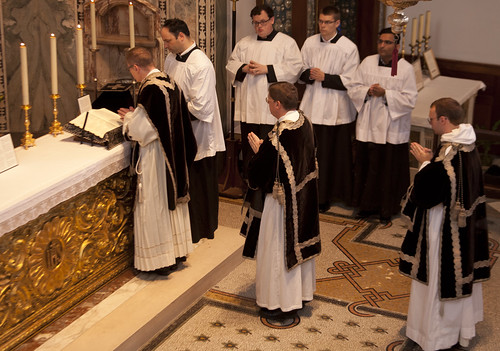 |
| Liturgical prayer: a High Mass of Requiem |
What can one say, then, about Yoga and the Faith? Are Catholics wrong to feel uncomfortable, as they sometimes do, with Yoga being presented as something for people of 'all faiths and none', to take place in the parish hall like a cake-making demonstration?
I think the easiest way for Westerners to think about Yoga is as related to the New Age. Yoga is such a huge movement that it has a distinct identity from the New Age; also the physical exercise side of Yoga claims to be scientific and medical, and (at least to a degree) is genuinly so. But on the other hand, Yoga derives from many of the same attitudes and aspirations as the New Age, and fits it very comfortably with it. The New Age is full of attempts to use techniques to transcend and to heal; Yoga is one such technique.
Monday, September 04, 2017
What's wrong with Yoga? Part 1
 |
| Physical Culture: from Wikipedia Commons |
Yoga is one of those hot-button issues which arouses strong feelings in Catholic social media, and as much of the discussion is not very well informed, I thought I'd try to inform it a little.
Before my full assimilation into traddie-land I did a bit of Yoga myself for a few years; accordingly I have my own impressions of the general atmosphere and attitudes of Yoga classes, books, and personal practice. However it must be said that my experience was fairly superficial; I never entered any inner circle of Yoga adepts. The spiritual aspects of Yoga was part of the reason I stopped: I got fed up with being told to say 'Om', for example. Another was doubts about its physical efficacy. I don't deny the health benefits, but there is a natural tendency in Yoga to want to advance to the more perfect performance of more difficult postures, and, in short, become really really bendy, and while being a bit bendy is probably a good idea, I don't think it is particularly beneficial to be really really bendy. However, I'm not qualified to comment further on that.
In this post I want to talk about the philosophico/religious presuppositions of Yoga, or rather why it is so difficult to talk about such presuppositions. Having cleared this ground, in the next post I'll say what I think can be said about Yoga as a phenomenon, and its relationship with the Catholic Faith.
Labels:
New Age,
Roman Forum Summer Symposium Gardone,
Yoga
Friday, September 01, 2017
Epiphany and Ascension restored to their proper days
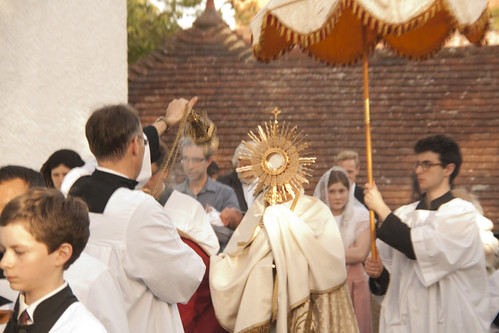 |
| Corpus Christi Procession in Oxford: on the correct day |
Here is the Bishops' Decree. We can now set our sights on restoring Corpus Christi to its proper date, and reversing the decision of 1984 to move the celebrations of all the Holy Days to Sunday when they fall on a Saturday or a Monday (except Christmas). At any rate, it seems we'll have a few more years to advertise the fact that if you want to attend Corpus Christi on its 'particular day' (as the CDW expresses it) you'll have to go to the Traditional Mass.
Irreversible reform? Me in the Catholic Herald this weekend
This weekend the Catholic Herald has a cover story about the Traditional Mass' appeal to young people, by Matthew Schmitz.
Accompanying this is a shorter piece by me on Pope Francis' remarks, made in a speech to a group of Italian liturgists, that the 'reform' is 'irreversible'.
It is not available online, so you'll need to look out for a paper edition. Here's a taster.
Pope Francis’s recent address on the liturgy – about which he has hitherto said little – was striking for its conventionality. In almost every respect, the Pope’s speech hews to the official, post-Vatican II line. It emphasises the continuity of the post-conciliar reform with the efforts of Pius X and XII; it praises the reform for its “vitality”; it condemns liturgical abuses (“deformations”); and it calls for an end to liturgical conflict.
But it has raised eyebrows for its rejection of the possibility of revisiting the “decisions” of the reform in light of its “inspirational principles: an explicit rejection of the “Reform of the Reform” project, which seeks to go back to the Council documents and do the reform again, better. This should be no surprise. In the official mindset, the reform was perfect and was marred only by liturgical abuses. Liturgical progressives should note that the account of the liturgy which follows is entirely traditional, focusing on the altar, the Sacrifice of the Mass, and the Priesthood of Jesus Christ, not even mentioning the Last Supper, the Mass as a shared meal or the liturgy as an affirmation of community.
Support the work of the LMS by becoming an 'Anniversary Supporter'.
Accompanying this is a shorter piece by me on Pope Francis' remarks, made in a speech to a group of Italian liturgists, that the 'reform' is 'irreversible'.
It is not available online, so you'll need to look out for a paper edition. Here's a taster.
Pope Francis’s recent address on the liturgy – about which he has hitherto said little – was striking for its conventionality. In almost every respect, the Pope’s speech hews to the official, post-Vatican II line. It emphasises the continuity of the post-conciliar reform with the efforts of Pius X and XII; it praises the reform for its “vitality”; it condemns liturgical abuses (“deformations”); and it calls for an end to liturgical conflict.
But it has raised eyebrows for its rejection of the possibility of revisiting the “decisions” of the reform in light of its “inspirational principles: an explicit rejection of the “Reform of the Reform” project, which seeks to go back to the Council documents and do the reform again, better. This should be no surprise. In the official mindset, the reform was perfect and was marred only by liturgical abuses. Liturgical progressives should note that the account of the liturgy which follows is entirely traditional, focusing on the altar, the Sacrifice of the Mass, and the Priesthood of Jesus Christ, not even mentioning the Last Supper, the Mass as a shared meal or the liturgy as an affirmation of community.
Support the work of the LMS by becoming an 'Anniversary Supporter'.
Subscribe to:
Posts (Atom)
